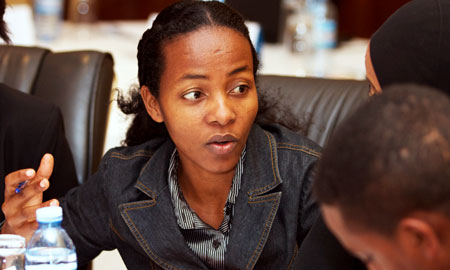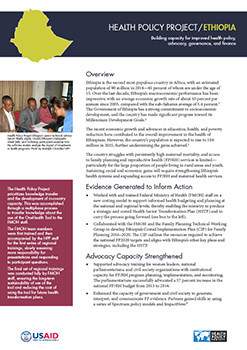The Health Policy Project ended in 2016. Work continued under Health Policy Plus (HP+) until 2022.
Ethiopia

Country & Regional Programs
- ► Africa
- ► Asia and the Middle East
- ► Europe and Eurasia (E&E)
- ► Latin America and the Caribbean (LAC)
Overview
Over the past decade, Ethiopia has made notable progress in education, health, and other key areas to alleviate poverty. Yet, continued high population growth exerts pressure on the country’s resources and erodes its capacity to provide essential healthcare services. Access to high-quality family planning and maternal health services is limited, particularly among the predominantly rural population. In order to continue improvements in social and economic development, it is essential for government and civil society leaders to strengthen the nation’s health systems and expand the reach of family planning and reproductive health services.
What We Do
The Health Policy Project (HPP) is committed to supporting Ethiopia in its progress toward ensuring high-quality healthcare services for its citizens. We contribute to strengthening capacity of government, health and population organizations, and academic institutions to analyze data and create evidence-based solutions to improve family planning and reproductive health programs. HPP also works with local partners to address gender inequities and increase women’s leadership and participation in health planning and programs.
Strengthen Capacity of Leaders to Expand Family Planning and Reproductive Health
Data and evidence are essential for decision-makers and national health institutions to craft effective policies and design programs that address the needs of their constituents. HPP trains Ethiopian government leaders, health officials, and university faculty to apply software models and tools to help them understand the costs and benefits associated with expanding family planning services. These tools help users analyze population projections, estimate the cost of health programs, and determine the impact of investments in health.
Enhance Coordination of Health Policy, Planning, and Programs
The HPP program in Ethiopia works at both national and regional levels to strengthen institutional capacities and align public and private sector health strategies with the aim of improving overall coordination in planning, monitoring, and evaluating population and reproductive health programs.
Promote Gender Equality in Health Services
HPP works with leaders in government and health institutions to promote the health of women and girls and make services more equitable. We provide technical assistance to local partners to integrate gender equality principles into health policies and programs, as well as promote multisectoral coordination around key gender and health issues. HPP also builds the capacity of women leaders to advocate for improved family planning and reproductive health services.

Hon. Alemtsehay Paulos, a member of Parliament from Ethiopia, talks with her country delegation during an advocacy skills training session at the HPP-sponsored Women Parliamentarians Meeting: Enhancing Leadership for Family Planning and Reproductive Health in Kampala, Uganda in August 2012.
Publications and Resources
The Near-Term Health and Economic Benefits of Family Planning in the Amhara Region, Ethiopia
Using the ImpactNow model, the USAID-funded Health Policy Project collaborated with the Amhara Regional Health Bureau (RHB) to estimate the near-term benefits of achieving Ethiopia’s ambitious family planning goals in the region. This brief summarizes key health and economic benefits associated with achieving these goals and offers recommendations for the Regional Health Bureau to increase investment in and improve family planning services.
ImpactNow: Identifying the Near-term Benefits of Family Planning Investment in the Amhara Region—Results Dissemination Workshop
The USAID-funded Health Policy Project applied its new ImpactNow model to estimate the near-term health and economic benefits of achieving family planning goals in the Amhara region of Ethiopia. This report presents the proceedings of the preliminary results dissemination meeting, held in Bahir Dar in May 2014, attended by the Amhara Regional Health Bureau and representatives from the Federal Ministry of Health.
Resources for Awareness of Population Impact on Development (RAPID): The case of Amhara Region (RAPID Amhara)
This policy brief highlights the USAID-funded Health Policy Project's application of the RAPID model to forecast integrated data and evidence on population and socioeconomic projections for the Amhara region.
Projecting Ethiopian Demographics from 2012-2050 Using the Spectrum Suite of Models
With support from the USAID-funded Health Policy Project, the Ethiopian Public Health Association applied the DemProj module of the Spectrum suite of models to project the size of the Ethiopian population from 2012 to 2050. Based on the data from the model, recommendations were made to accelerate access to family planning services and to increase investments in health, education, and other development sectors to take advantage of the demographic dividend.
Fertility and Family Planning Implications of Ethiopia's FP2020 Target
The USAID-funded Health Policy Project supported partners at Gondar University to use the FamPlan model to analyze the demographic and family planning program implications of meeting Ethiopia’s Family Planning 2020 (FP2020) targets.
Ethiopia Country Factsheet (PDF)
The Benefits of Family Planning to Avert Infant and Child Deaths in Ethiopia
The Ethiopian Ministry of Health, in collaboration with HPP, recently used the FamPlan model to measure the impact of increased family planning use on the number of infant and child deaths. This poster—presented at the 2013 International Conference on Family Planning in Addis Ababa, Ethiopia—describes the methodology and results of the model application.
ImpactNow Demonstrates the Short-Term Benefits of Investing in Family Planning
ImpactNow, a new family planning advocacy model, generates evidence to make the case for immediate family planning (FP) investments by modeling gains in maternal and child deaths averted, unintended pregnancies, and financial savings to the healthcare system as a result of FP uptake.
HIV/AIDS and Sexual Reproductive Health Among University Students in Ethiopia: A Policy Intervention Framework
In Ethiopia, HPP is supporting the Federal HIV/AIDS Prevention and Control Office and higher education institutions (HEIs) to prioritize and target HIV interventions in HEI settings. As part of this effort, HPP assisted the government's HEI Partnership sub-Forum against HIV/AIDS with developing a Planning, Monitoring, and Evaluation Framework for HIV/AIDS and SRH interventions in HEIs.
Family Planning in Ethiopia
The brief highlights the important role of family planning in achieving maternal health and other development goals, as well as presents policy recommendations for increasing family planning use.
Photo Gallery: Health Policy Project Ethiopia
View photos from the Health Policy Project office in Ethiopia.
Photos: Women Parliamentarians Meeting – Leadership for Family Planning
Health Policy Project partner, Partners in Population and Development Africa Regional Office (PPD ARO) organized a workshop for women parliamentarians focusing on leadership for family planning and reproductive health in August 2012.
News
News: Technical Update Training for Decision-Makers in Health
Story from the Field: Opening Doors to Better Family Planning
Women’s group leaders and parliamentarians discuss increased funding for reproductive health services for Ethiopian youth
News: Ethiopian Health and Population Professionals Learn to Use Software Tools for Analyzing Policies and Programs
Workshop strengthens capacity in applying data from modeling systems to build evidence-based decisionmaking and advocate for increased resources to improve health.
GAP Tool Aims to Promote Financing for FP/RH Programs
A broad spectrum of stakeholders met in Addis Ababa, Ethiopia, from June 20-24, 2011 to share the Health Policy Project's (HPP) GAP Tool for Financing Family Planning. The tool represents the process of gathering, analyzing, and planning at the country level to project the contraceptive, service provision, and program support funding gaps.
Partners
HPP collaborates with a range of in-country and international partners in Ethiopia, including:
- Federal Ministry of Health (FMOH)
- Federal MInistry of Women, Children, and Youth Affairs
- Ministry of Finance and Economic Development/Population Affairs Directorate (MOFED/PAD)
- Addis Ababa University
- Ethiopia Public Health Association (EPHA)
- Gondar University
- Population Health Environment (PHE)


